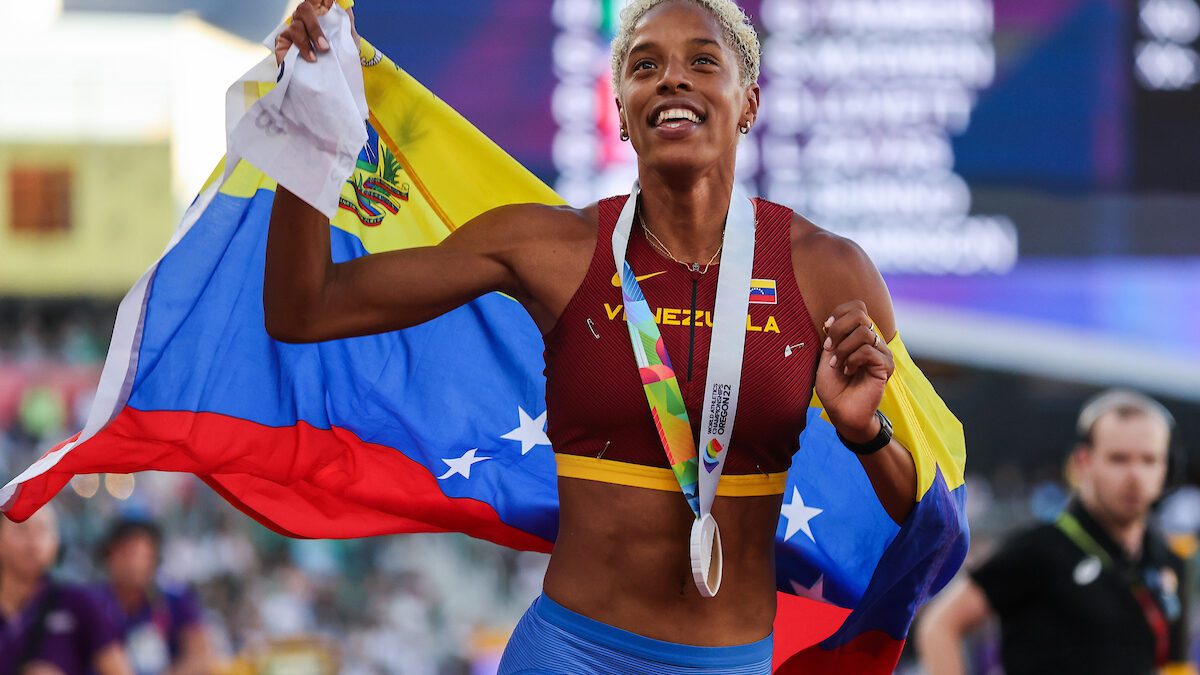How to self-talk like triple-jump world champ Yulimar Rojas
The Venezuelan athlete's stunning comeback at the World Athletics Championships holds lessons about the power of self-motivation
 Photo by:
Kevin Morris
Photo by:
Kevin Morris
If there’s one athlete who elevated athleticism to performance art at this month’s World Athletics Championships in Budapest, it’s Venezuelan triple-jumper and newly minted gold medallist Yulimar Rojas. The 27-year-old stole the show in the triple-jump finals even before her podium-topping 15.08m performance in Hungary last Friday. Rojas has earned admirers across disciplines and nationalities, not just for her stellar results, but for her animated pre-launch pep talks.
Through her lively blend of physicality and sports psychology, Rojas shows it’s not only important what you tell yourself, but how you say it. Here are four things runners can take away from Rojas’ electrifying self-talk technique to add some extra pep to their performances.
Curate the content
In a social-media post this week, Rojas peeled back some of the mystery of what exactly she was saying to psych herself up when the chips were down in Budapest. “I always try to have pep talks with myself before I go for a jump,” reads an Instagram post translated from her native Spanish. “On that last jump I said, you can do this, you’ve done this before … just one more push. I even talk to God: Come on, I’ve always done what you asked me to, show them you’re always with me,” she wrote. She added it’s important to remind herself that her “mental power is strong and that I can overcome any difficulty, any fear, any insecurity, if I put my mind to it, even if I’m sinking without knowing how to get out of there.” The first key to following Rojas’s successful self-talk strategy, then, is to curate the content to keep your messaging positive. Opt for affirming statements (“I’ve got this”) over those that focus on the negative (“Don’t blow this”).
Make it a ritual
Like any other part of training, self-talk can seem laboured and awkward if it’s something you’re not used to doing. The more you practise it, the more natural it becomes and the better it serves you. Over the years Rojas has turned self-talk into a consistent and essential part of her performances—for her, it’s every bit as much of her discipline as the hop, step and jump. Making an effort to consistently and deliberately inject a dose of positivity about your run—whether that’s by saying a few motivational words at the start of every run, or using your running watch’s auto-lap beep as a cue to repeat a quick, positive mantra—will help build the mental muscle to summon a winning mindset when you need it most.
Get physical
Competing off-mic and out of earshot, we might not always know the specifics of what Rojas is telling herself each time she’s about to make a jump (especially for those us who can’t lip-read Spanish), but whatever it is, we sure know she means it. Her self-talk isn’t merely a verbal exercise, but something she proudly proclaims with her whole body–and her lack of self-consciousness is almost as inspiring as her jumping ability. Punctuating the positivity with hand claps, raising your fists to the air or a quick bout of shadowboxing can help drive home the motivating messages to yourself, and ensure your exercise in self-belief isn’t just lip service.
Put in the work
As helpful as self-talk is, motivational mantras and confident chest thumping alone won’t turn a four-hour marathoner into Cam Levins. With practice, self-talk can be a great tool for putting you in a better head space to compete, but don’t leave it to self-talk to do all the heavy lifting. As Rojas told teleSUR after taking gold in the triple jump at the 2018 World Indoor Championships in Birmingham, England, “It’s been very hard work. It took a long time to get to this moment.”

